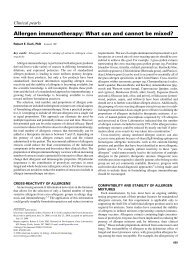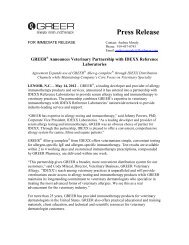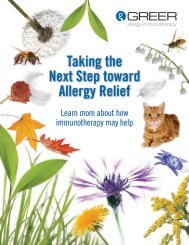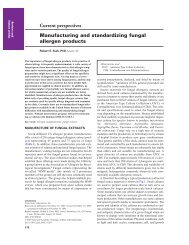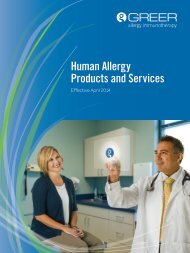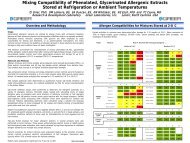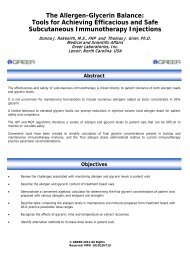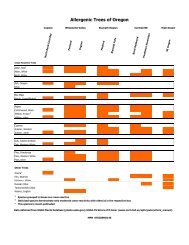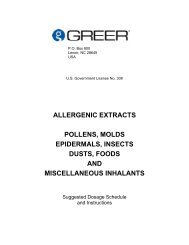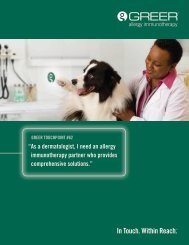Veterinary Allergy Products and Services - Greer
Veterinary Allergy Products and Services - Greer
Veterinary Allergy Products and Services - Greer
You also want an ePaper? Increase the reach of your titles
YUMPU automatically turns print PDFs into web optimized ePapers that Google loves.
ALLERGENIC EXTRACT – FLEA ANTIGEN<br />
DIRECTIONS FOR USE<br />
FLEA ANTIGEN<br />
DESCRIPTION: Flea antigen is an aqueous extract of the whole bodies of Ctenocephalides spp.<br />
with phenol added as a preservative.<br />
ACTIONS: The exact mechanism by which flea antigen elicits an allergic response is still under<br />
investigation. It has been demonstrated however, that successful hyposensitization treatment<br />
decreases specific IgE antibody levels, theoretically by increasing the level of blocking IgG<br />
antibodies. These blocking IgG antibodies are believed to complex with the circulating antigen<br />
before it can reach the IgE present on the skin <strong>and</strong> trigger the allergic response.<br />
INDICATIONS<br />
1. DIAGNOSTIC: Flea antigen is a valuable aid in the diagnosis of flea bite allergy.<br />
Compatible clinical signs <strong>and</strong> documented exposure to fleas are also necessary to establish<br />
the diagnosis.<br />
2. THERAPEUTIC: Flea antigen extract is indicated as an aid in alleviating the symptoms<br />
associated with flea bite allergy. A program of controlling the flea population by breaking<br />
the life cycle <strong>and</strong> minimizing flea infestation on the animal should be initiated before or<br />
concurrent with hyposensitization treatment. Concomittant antibiotic therapy <strong>and</strong> an<br />
appropriate bathing program should be given where significant secondary bacterial<br />
infection is evident. Short-term corticosteroid therapy may be used as an adjunct in the<br />
early stages of therapy.<br />
CONTRAINDICATIONS<br />
1. DIAGNOSTIC: Corticosteroids will inhibit the histamine mediated immediate skin test.<br />
Any patient that has undergone continual corticosteroid treatment should discontinue this<br />
treatment for a period of one week for every month of said treatment before this patient is<br />
skin tested. However, animals with severe skin problems should be treated with antibiotics,<br />
soothing baths <strong>and</strong> possibly short term oral cortisone until their skin conditions will not<br />
interfere with skin testing.<br />
2. THERAPEUTIC: Flea antigen is indicated for hyposensitization only when flea bite<br />
hypersensitivity has been unequivocally demonstrated both clinically <strong>and</strong> by intradermal skin<br />
testing.<br />
PRECAUTIONS: Have in stock the following:<br />
1. A hydrocortisone (such as Solu-Cortef ® ) or a prednisolone (such as Solu-Delta-Cortef ® ).<br />
2. An antihistamine such as diphenhydramine hydrochloride (Benadryl ® ).<br />
3. Epinephrine diluted 1:1,000.<br />
Keep patient under observation for a period of at least 30 minutes after administration.<br />
Note: Animals prone to severe reactions should be given diphenhydramine hydrochloride<br />
(Benadryl ® ) 30 minutes prior to treatment dose administration.



